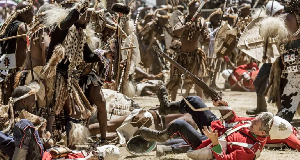The recent chieftaincy clash and its subsequent casualties at Anloga have prompted me to question the institution that is supposed to be a repository of our collective culture. It appears no one seem to care when people of such low estate lose their lives in such clashes. Six human beings have died and that in itself means a lot to any group of people who place the same value on life irrespective of the position one holds in society.
I will first like to share my condolence with the families that lost people in the recent clashes. My heart and prayer go to all of them.. All right thinking Anlo people should ask themselves what symbolic development project was left behind by Awoemefia Adeladza that we can point to? Nothing! What can the incoming one do? Nothing. It therefore does not merit the loss of life.
It is high time Ghana takes a second look at the institution of chieftaincy. In my humble opinion the institution needs to be refined to serve only our cultural purposes. All political and economic powers should be taken away from the institution. That will mean government should pursue land reform that will vest land in the state instead of chiefs. I know this will not sound okay to some but it is the way forward for the country. No matter what, land vested in government will stand to benefit us more than the present system we have.
Our economic history should teach us a lesson which our leaders and intellectuals are just ignoring. When in1896 the British proposed the Lands Bill, our chiefs and educated elite objected to it. This led to the formation of the Aborigines Right Protection Society (ARPS), historically it was the right thing they did at that to preserve our national resource. However when looked at from the post independence time, government would have inherited the land from the British. The same bill was passed in Malaysia because there was no resistance. At independence they had their land vested in the state. For those who care, you can read this work to understand the Malaysian land issue. http://www.serd.ait.ac.th/ump/op8.pdf
The Americans have a numbers of Acts that were geared toward federal government control of land. Somewhere in continental Europe and England, Feudalism had to end for land to be administered by a central authority. That is why I get amazed that the national authority plays second fiddle when it comes to the question of land instead of the other way round.
If chiefs hold land in trust for their people, who do they account to? No one probes their sale of land. Land is sold multiple times and people lose their lives pursuing land that they have purchased with their toil. It is time we start discussing this. This is not about gold, diamond, bauxite on any land. This is a question of moving our country from a quasi-feudal system to a modern one. We cannot achieve that if the present arrangement which vests land in the hands of the stool and skin is not altered.
I am all for the institution of chieftaincy if we can water down some of their influence which is impacting negatively on our people.
A critical look at our local government system shows that political power is given to people way down as far as to town and zonal levels. The regions have ministers and the district chief executives. What these local government officials do not touch is our culture which I believe our chiefs are the right people to handle. Feature page















